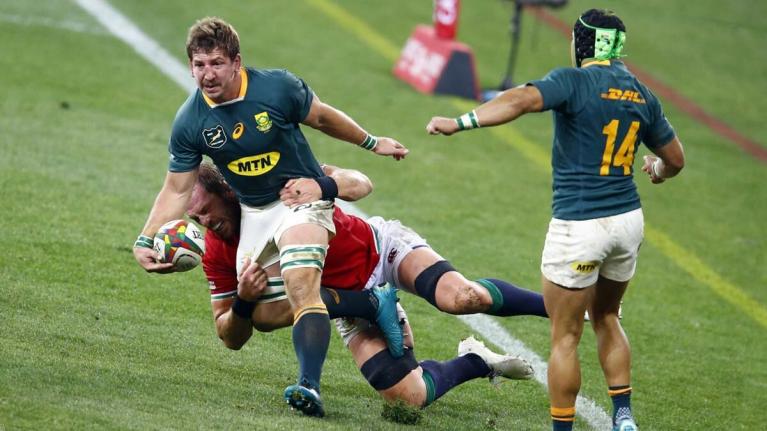Springboks set to reinforce Japan-led approach to optimum performance

In 2019, ahead of the first World Cup held outside of the traditional rugby nations, Japan took a unique approach to preparing for the showcase competition.
Instead of the Brave Blossoms players turning out week after week for the Sunwolves, Jamie Joseph regularly pulled men out of Super Rugby altogether to train with the national squad.
While the Sunwolves were playing the top teams, the World Cup training squad was competing against Super Rugby development sides. Matches were limited - both in volume and in challenge - but that didn't bother Joseph. Come the World Cup, the Brave Blossoms were one of the most cohesive and well put-together sides.
Japan's players were fresh and ready for action and played the likes of Ireland and Scotland off their feet. They also had a clean bill of health, and they achieved a historic quarter-final finish at the competition.
Contrast that with the likes of traditional superpower England.
While Japan were wrapping their players in cotton wool and keeping their playing minutes to a minimum, England supersized their schedule.
In 2019, Japan played just four tests - against Tonga, Fiji, USA and South Africa - in the lead-up to the World Cup.
England played nine.
While England's top stars - who were expected to peak in November - began their campaign in February with a match against Ireland, Japan's brightest were playing in the odd Super Rugby match, but mostly sticking to training camps.
Come the end of the year, Japan played nine tests altogether. England played 15 - and it would have been 16 if their World Cup pool match with France hadn't been cancelled due to the typhoon that hit Japan part-way through the tournament.
It was Japan, however, who overachieved - while England fell short at the final hurdle.
In short, Jamie Joseph and the Brave Blossoms showed that contrary to popular belief, you don't have to play a lot of tough rugby to prepare for big matches.
Last year, Argentina made a similar statement, finishing second in the Tri-Nations, going undefeated against the Wallabies and recording their first-ever win over the All Blacks.
That was all on the back of minimal preparation throughout the season due to the impact of COVID.
The Jaguares played a handful of games before the world came to a standstill, and Argentina's top players were put on ice and didn't play a single professional game until they showed up in Australia hungry to prove that a lack of minutes wouldn't hold them back.
Now, a similar task is being asked of the Springboks.
While half of the squad plays their club rugby in Europe, the remainder have been limited to dribs and drabs of minutes in the Rainbow Cup and a handful of Currie Cup matches (when Covid hasn't forced round-wide cancellations).
As a team, the Springboks have played just two games together since their 2019 Rugby World Cup triumph - the rusty first-up clash with Georgia at the start of the month, and their win over the Lions while playing under the guise of South Africa A.
Unsurprisingly, both the Springboks and the Lions looked far from their best in their opening test on Saturday, with the result ultimately boiling down to which team made the fewest unforced errors.
While the Lions have now played a handful of matches as part of their tour, the team they rolled out in their 5-point win over South Africa was almost an entirely new composition to any line-up they'd fielded in the past three weeks. As such, it's no major surprise the team looked rusty.
In past tours, the Lions have tended to field a team very close to their top line-up in at least one of their warm-up matches played prior to the first test.
In 2017, the match-day squad they rolled out against the Crusaders on June 10 and the Maori All Blacks on June 17 was, bar a few players, the same as their test team.
They've had no such opportunity this year, however, due to players being put into isolation for short burst of time whenever any potential signs of sickness appear.
What we're left with are two teams that haven't played a whole lot of rugby together and might lack match cohesiveness. Cohesiveness doesn't have to just be built on the playing field, however, as Japan showed in 2019 - it can be forged on the training pitch.
The important thing is that both teams should be physically fresh come the second test and with another game and a week of training under their belts, the best is clearly yet to come for this series.
The global pandemic has seen to it that this won't be the Lions tour that was so eagerly anticipated following the Springboks' 2019 World Cup triumph, but a lack of game time shouldn't preclude it from still playing out in an exciting fashion.
Saturday's game was not easy on the eyes but that will quickly change and, providing South Africa can come back strong in the second test, we still should have a tense series on our hands.
Latest Comments
The sharks will win
Go to commentsOnly the 10-man game can win you a RWC these days, sadly.
Go to comments